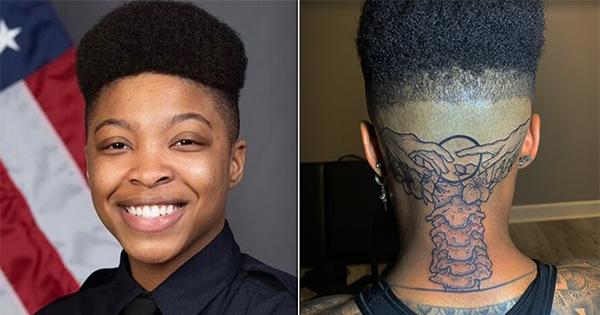
Nationwide — Kay’Ana Adams, an African American female firefighter from Mobile, Alabama, was dismissed from her position last year after the local fire department determined her tattoo violated department policy. She had served at the Maryvale station in the city of Mobile for nine months before her termination. The tattoo, located on the back of her head, became a point of contention despite her belief that it did not breach the department’s guidelines, which prohibit tattoos on the face or neck.Adams explained that the department had previously hired individuals with more prominent neck tattoos than hers, leading her to believe her tattoo was acceptable. “I figured mine could be done in decency and order. I could also, based on the rules, cover it up,” she told WKRG. However, a complaint about her tattoo led to an investigation and ultimately her dismissal.
Initially, Adams was given the option to grow her hair out to conceal the tattoo, which she complied with. Yet, she faced another complaint, this time about her hair growth. As a Black woman, Adams highlighted the unique challenges she faced in meeting these requirements, stating, “We have different textures of hair. So, you have no idea how long it takes for my hair to grow.”
The fire department updated its policy three months after Adams got her tattoo, now banning head tattoos above the neckline. Despite adhering to the new regulations by covering her tattoo, Adams was still photographed and subsequently fired. She expressed her disbelief, saying, “I never thought it would come to this, especially considering I was in compliance.”
Adams suspects her termination was not solely about the tattoo. She had filed a grievance regarding the tattoo complaint and reported instances of harassment and antagonization, including sexist remarks from colleagues. Additionally, she raised concerns during a training session when some trainees discussed tying nooses, prompting her to voice her discomfort.
The situation escalated when Captains Jason Craig and Rodrick Shoots, members of the Black Progressive Firefighters Association, defended Adams. Their support led to disciplinary actions against them: Craig was suspended for 30 days, and Shoots was terminated. Public Safety Director Lawrence Battiste cited Craig’s suspension for insubordination and failure to follow orders, while Shoots was fired for attempting to obstruct a superior officer’s orders.
This incident sheds light on broader issues faced by African American women in the workplace, particularly regarding discrimination related to their hairstyles. Despite progress, many Black women still encounter prejudices and policies that unfairly target their natural hair and protective styles, often leading to unjust consequences, as seen in Adams’ case. Such discriminatory practices highlight the ongoing need for policy reform and cultural sensitivity in workplaces to ensure fair treatment for all employees.
